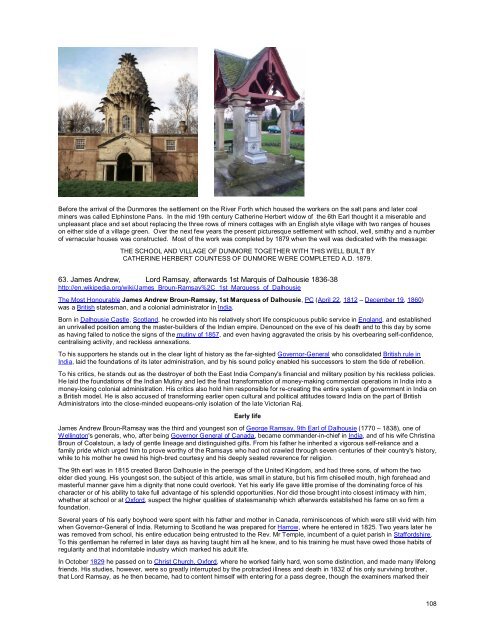Grand Masters of Scotland - Onondaga and Oswego Masonic ...
Grand Masters of Scotland - Onondaga and Oswego Masonic ...
Grand Masters of Scotland - Onondaga and Oswego Masonic ...
Create successful ePaper yourself
Turn your PDF publications into a flip-book with our unique Google optimized e-Paper software.
Before the arrival <strong>of</strong> the Dunmores the settlement on the River Forth which housed the workers on the salt pans <strong>and</strong> later coal<br />
miners was called Elphinstone Pans. In the mid 19th century Catherine Herbert widow <strong>of</strong> the 6th Earl thought it a miserable <strong>and</strong><br />
unpleasant place <strong>and</strong> set about replacing the three rows <strong>of</strong> miners cottages with an English style village with two ranges <strong>of</strong> houses<br />
on either side <strong>of</strong> a village green. Over the next few years the present picturesque settlement with school, well, smithy <strong>and</strong> a number<br />
<strong>of</strong> vernacular houses was constructed. Most <strong>of</strong> the work was completed by 1879 when the well was dedicated with the message:<br />
THE SCHOOL AND VILLAGE OF DUNMORE TOGETHER WITH THIS WELL BUILT BY<br />
CATHERINE HERBERT COUNTESS OF DUNMORE WERE COMPLETED A.D. 1879.<br />
63. James Andrew, Lord Ramsay, afterwards 1st Marquis <strong>of</strong> Dalhousie 1836-38<br />
http://en.wikipedia.org/wiki/James_Broun-Ramsay%2C_1st_Marquess_<strong>of</strong>_Dalhousie<br />
The Most Honourable James Andrew Broun-Ramsay, 1st Marquess <strong>of</strong> Dalhousie, PC (April 22, 1812 – December 19, 1860)<br />
was a British statesman, <strong>and</strong> a colonial administrator in India.<br />
Born in Dalhousie Castle, <strong>Scotl<strong>and</strong></strong>, he crowded into his relatively short life conspicuous public service in Engl<strong>and</strong>, <strong>and</strong> established<br />
an unrivalled position among the master-builders <strong>of</strong> the Indian empire. Denounced on the eve <strong>of</strong> his death <strong>and</strong> to this day by some<br />
as having failed to notice the signs <strong>of</strong> the mutiny <strong>of</strong> 1857, <strong>and</strong> even having aggravated the crisis by his overbearing self-confidence,<br />
centralising activity, <strong>and</strong> reckless annexations.<br />
To his supporters he st<strong>and</strong>s out in the clear light <strong>of</strong> history as the far-sighted Governor-General who consolidated British rule in<br />
India, laid the foundations <strong>of</strong> its later administration, <strong>and</strong> by his sound policy enabled his successors to stem the tide <strong>of</strong> rebellion.<br />
To his critics, he st<strong>and</strong>s out as the destroyer <strong>of</strong> both the East India Company's financial <strong>and</strong> military position by his reckless policies.<br />
He laid the foundations <strong>of</strong> the Indian Mutiny <strong>and</strong> led the final transformation <strong>of</strong> money-making commercial operations in India into a<br />
money-losing colonial administration. His critics also hold him responsible for re-creating the entire system <strong>of</strong> government in India on<br />
a British model. He is also accused <strong>of</strong> transforming earlier open cultural <strong>and</strong> political attitudes toward India on the part <strong>of</strong> British<br />
Administrators into the close-minded euopeans-only isolation <strong>of</strong> the late Victorian Raj.<br />
Early life<br />
James Andrew Broun-Ramsay was the third <strong>and</strong> youngest son <strong>of</strong> George Ramsay, 9th Earl <strong>of</strong> Dalhousie (1770 – 1838), one <strong>of</strong><br />
Wellington's generals, who, after being Governor General <strong>of</strong> Canada, became comm<strong>and</strong>er-in-chief in India, <strong>and</strong> <strong>of</strong> his wife Christina<br />
Broun <strong>of</strong> Coalstoun, a lady <strong>of</strong> gentle lineage <strong>and</strong> distinguished gifts. From his father he inherited a vigorous self-reliance <strong>and</strong> a<br />
family pride which urged him to prove worthy <strong>of</strong> the Ramsays who had not crawled through seven centuries <strong>of</strong> their country's history,<br />
while to his mother he owed his high-bred courtesy <strong>and</strong> his deeply seated reverence for religion.<br />
The 9th earl was in 1815 created Baron Dalhousie in the peerage <strong>of</strong> the United Kingdom, <strong>and</strong> had three sons, <strong>of</strong> whom the two<br />
elder died young. His youngest son, the subject <strong>of</strong> this article, was small in stature, but his firm chiselled mouth, high forehead <strong>and</strong><br />
masterful manner gave him a dignity that none could overlook. Yet his early life gave little promise <strong>of</strong> the dominating force <strong>of</strong> his<br />
character or <strong>of</strong> his ability to take full advantage <strong>of</strong> his splendid opportunities. Nor did those brought into closest intimacy with him,<br />
whether at school or at Oxford, suspect the higher qualities <strong>of</strong> statesmanship which afterwards established his fame on so firm a<br />
foundation.<br />
Several years <strong>of</strong> his early boyhood were spent with his father <strong>and</strong> mother in Canada, reminiscences <strong>of</strong> which were still vivid with him<br />
when Governor-General <strong>of</strong> India. Returning to <strong>Scotl<strong>and</strong></strong> he was prepared for Harrow, where he entered in 1825. Two years later he<br />
was removed from school, his entire education being entrusted to the Rev. Mr Temple, incumbent <strong>of</strong> a quiet parish in Staffordshire.<br />
To this gentleman he referred in later days as having taught him all he knew, <strong>and</strong> to his training he must have owed those habits <strong>of</strong><br />
regularity <strong>and</strong> that indomitable industry which marked his adult life.<br />
In October 1829 he passed on to Christ Church, Oxford, where he worked fairly hard, won some distinction, <strong>and</strong> made many lifelong<br />
friends. His studies, however, were so greatly interrupted by the protracted illness <strong>and</strong> death in 1832 <strong>of</strong> his only surviving brother,<br />
that Lord Ramsay, as he then became, had to content himself with entering for a pass degree, though the examiners marked their<br />
108







![Richard [Nicholls] Harison / Harrison - Onondaga and Oswego ...](https://img.yumpu.com/24950065/1/190x245/richard-nicholls-harison-harrison-onondaga-and-oswego-.jpg?quality=85)

![Richard [Nicholls] Harison / Harrison - Onondaga and Oswego ...](https://img.yumpu.com/24950063/1/190x245/richard-nicholls-harison-harrison-onondaga-and-oswego-.jpg?quality=85)







